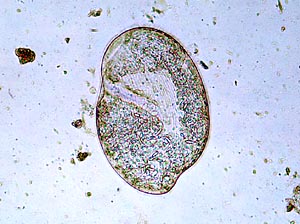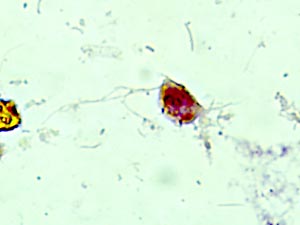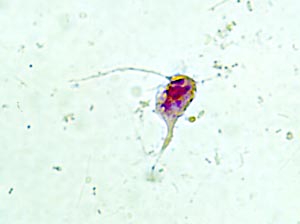 Balantidium spp
Balantidium spp
 |
|---|
|
Balantidium spp Direct smear on slide glass Dried by cool air Methyl alcohol fixation Dehydrated by ethyl alcohol, xylol Objective lens:OLYMPUS DPLAN 10x Photographic lens:OLYMPUS LD 5x Camera:PENTAX 645 body, self-made adaptor Film:FUJI VELVIA 120 Koehler illumination |
 Trichomonas spp
Trichomonas spp
 |
|---|
|
Tri-trichomonas spp Direct smear on slide glass Dried by cool air Methyl alcohol fixation Dehydrated by ethyl alcohol, xylol Gimsa stain Objective lens:OLYMPUS Ach 40x Photographic lens:OLYMPUS LD 5x Camera:PENTAX 645 body, self-made adaptor Film:FUJI VELVIA 120 Koehler illumination |
Taking special care treating trichomonas and eventhough the number had decreased, they will be in their position again.
As a result, we quit treating for trichomonas anymore. We are keeping 14 iguanas now and the eldest is 9 years old. They all carry bunch of trichomonas but they are all healthy and reproducing. I think trichomonas are not a parasite. They seem to have a symbiotic relation or a non-pathogenic parasite.
 |
|---|
|
Tri-trichomonas spp Direct smear on slide glass Dried by cool air Methyl alcohol fixation Dehydrated by ethyl alcohol, xylol Gimsa stain Objective lens:OLYMPUS Ach 40x Photographic lens:OLYMPUS LD 5x Camera:PENTAX 645 body, self-made adaptor Film:FUJI VELVIA 120 Koehler illumination |